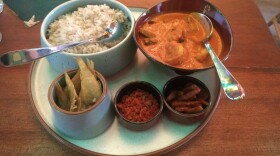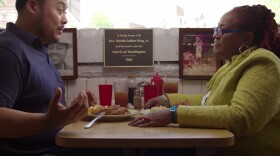-
Drawn in by fresh eggs, or the possibility of feathered friends, people continue to flock toward backyard chickens. One researcher wonders if local laws are doing enough to keep people and birds safe.
-
Historical photos show fishermen with chinooks almost as tall as they are. A century's worth of dam-building, overfishing, habitat loss and hatcheries has cut the size of the average fish in half.
-
Microbe-free bovine life would be rough. Cows rely on single-cell accomplices for their digestion, so scientists are looking for ways to use these bugs to improve cows' eating and burping habits.
-
An analysis of nearly 90 studies finds that warming temperatures may alter where key crops grow across the state, which provides about two-thirds of America's produce.
-
David Chang's show, Ugly Delicious, delves into how various cultures approach comfort foods that have complicated back stories. "There's no universal truth about any food," says the chef.
-
A microscope that clips on to your phone's camera can detect bacteria, such as salmonella or E. coli, even in tiny amounts. But the technology can't yet distinguish between good and bad bacteria.
-
The Swedes are fiercely devoted to almond paste- and whipped cream-filled semla. (One king died after gorging on them.) And the day before Lent is game time for feasting before the fast.
-
When canola seedpods shatter prematurely, farmers can lose a lot of their crop. Scientists have now figured out how this happens, and it has implications for similar crops facing global warming.
-
If you're looking to throw a space-themed dinner party this weekend, the season finale of Star Trek: Discovery on Sunday is a good place to go for intergalactic inspiration.
-
Bob Bob Ricard, the luxury London restaurant, is one of the first to try cutting 25 percent off menu prices during off-peak times to attract more budget-minded customers. And it seems to be working.
-
In the biggest tea-producing region of India, hazards range from red spider mites to wild elephants. One brave grower faces them head on, all while spurring a movement to grow tea organically.
-
Many seafood lovers use the Monterey Bay Aquarium's ratings to choose sustainable fish. Now it has rolled out a tool to help corporations assess the risk of human trafficking in seafood supply chains.
















